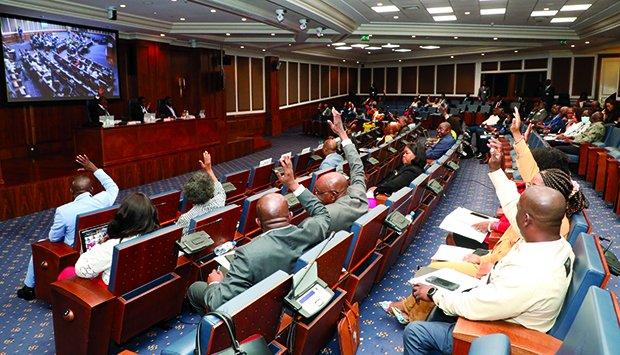Africa-Press – Angola. The proposal for the General Labor Law has been ready, since Monday, for voting in its entirety, to take place on the 25th of this month, after several days of specialist discussions, which allowed to improve the systematic nature, of legal coherence, logic and grammatical.
In reaction to the end of the activities in the specialty, the Secretary of State for Work and Social Security, in a tone of gratitude for the parliamentary day, underlined that there were eight days of intense debates, in which “a democratic exercise” was witnessed, with the opportunity to collect contributions, both from the deputies and from the different social partners.
Pedro Filipe emphasized the moment at the end of the approval of the Joint Opinion Report on the Proposed General Labor Law (LGT), which was under discussion and appreciation in the First, Fifth and Tenth Committees of the National Assembly, which received 28 votes in favor, none against and 13 abstentions.
Secretary of State Pedro Filipe highlighted, by the way, that the proponent of the proposal prepared a diploma capable of guaranteeing greater stability between employer and worker, taking into account the hearings collected by the social partners and the institutional experience of the deputies. The diploma, which will soon regulate the legal and labor relationship, stressed the Secretary of State for Labor and Social Security, accepted all those substantial changes with regard to disciplinary leaves, remuneration, rules on safety, health and hygiene at work, as well as grounds for disciplinary dismissals of workers.
The approval in the specialty of the Joint Opinion Report of the LGT Proposal, stressed Pedro Filipe, is synonymous with the proposal being enriched, demonstrating robustness for the interests of workers, companies and the national economy.
The Secretary of State for Labor and Social Security clarified that the drafting of the General Labor Law, to be approved in its entirety on the 25th of May, does not mean that there will be jobs, but will allow alignment in the legal-labour relationship and a favorable business environment, both nationally and abroad.
Pedro Filipe referred that the future General Labor Law will not give rise to new jobs, but rather ensure that companies have greater stability in the framework of hiring employees and also greater stability in the selection and qualification of the same.
The Secretary of State for Work and Social Security said that more than guaranteeing a balance between employer and employee, the diploma has as its ultimate aim the enhancement of human capital in the various domains.
The future General Labor Law, stressed Pedro Filipe, provides for the obligation of employers to invest in the professional training of their workers, as well as the duty of the worker to assume, also, the training that is carried out.
Maternity license
The Secretary of State for Labor and Social Security said that the proposed law provides for a period of three months of maternity leave, with pay and an additional four weeks (optional by the worker), but without pay, “as a result of the contributions made by deputies”.
In addition to this prerogative, stressed the representative of the proponent of the proposal, it is enshrined in the Civil Service Basic Law that, if there are technical conditions, women workers may also, in addition to these three months plus one, enjoy three months on a telework.
“It is not a license, but a privilege that the Telework regulation itself already provides for in cases of women who are responsible for minor children and even the regulation goes further, indicating five years, barring the error” , explained Pedro Filipe.
parental leave
Regarding parental leave, said Pedro Filipe, it was one of the matters that underwent profound changes. “Parents will continue to have a leave of 24 hours, that is, one day, remunerated. However, those who want, he continued, will be able to enjoy another seven unpaid working days.
work for minors
As for minors, there were no changes either. Under current legislation, Law 7/15, and even the debated proposal, it is possible for minors between the ages of 14 and 18 to work, which stems from the conventions of the International Labor Organization (ILO).
However, the performance of work by minors is subject to greater restrictions, both in terms of hours, since minors cannot be deprived of the possibility of continuing to study, and in terms of restrictions in relation to the period and nature of the work.
Regarding authorization, Pedro Filipe explained that being a minor and unable to exercise rights, it is necessary that their legal representatives (parents) authorize the minor to conclude the employment contract, without, however, risking exploitation.
Indefinite term contract
Pedro Filipe said that the format of the work contract for an indefinite period is the rule, but it is also important to know that the work contract for a fixed period will not disappear.
The question of the employment contract for an indefinite period, stressed the Secretary of State, will only be accepted under certain conditions of the nature of the activity itself. “We assume the employment contract for an indefinite period as a rule, but we will continue to have, under the terms of the law, a series of exceptions to this rule”, he said.
service commission contract
Another new feature of the future General Labor Law, stressed the Secretary of State for Labor and Social Security, is the introduction of the service commission contract, which will serve to hire workers who will assume management positions, namely managers, administrators , among others, that is, those positions of direct trust that must be provided with a specific contract.
Pedro Filipe said that before this type of service contract did not exist, but that workers who took on specific functions were provided by dispatches that are just “precarious instruments” that depended exclusively on the will of whoever appointed them.
The diploma on the new General Labor Law, which will be voted as a whole on the 25th of the current month, has 11 chapters, which contain 326 articles, 46 sections, 25 subsections, two divisions and five subdivisions.
NGO Law Proposal
Late yesterday afternoon, the deputies analyzed, in a preliminary way, the Proposal of Law that approves the Statute of Non-Governmental Organizations (NGOs), the Project of Law on Freedom of Assembly and Demonstration, as well as the Project of Law amending the organic law of the National Assembly.
MPLA deputy Esteves Hilário referred that it was a preliminary analysis of the diploma so that the conditions in terms of constitutionality can be seen and then go on to discuss in general.
“Many legal diplomas and some specific norms such as the right to meetings and demonstrations, and more, need to be updated”, considered the deputy.
For More News And Analysis About Angola Follow Africa-Press






